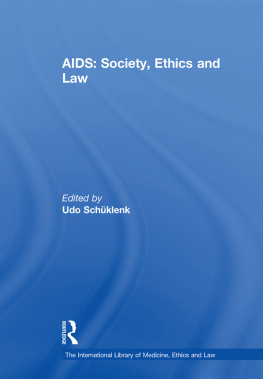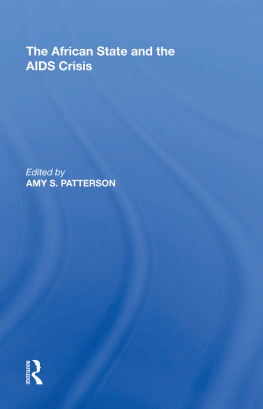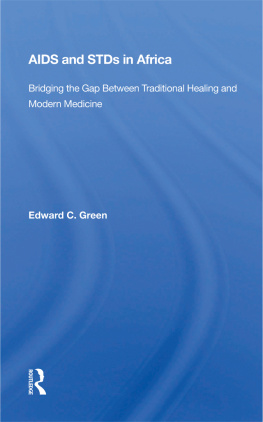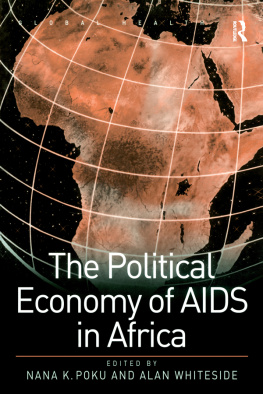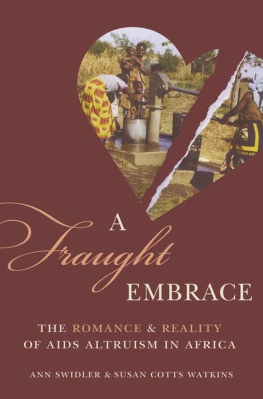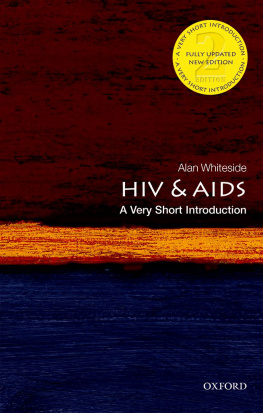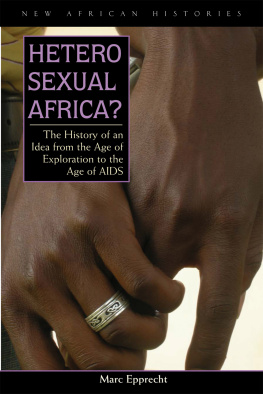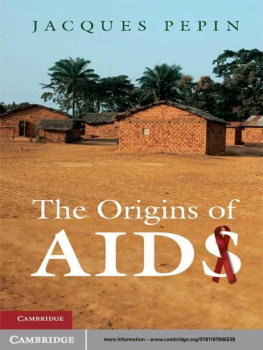ETHICS & AIDS IN AFRICA
THE CHALLENGE TO OUR THINKING
Editors: Anton A. van Niekerk, Loretta M. Kopelman
We dedicate this volume to the persons with HIV/AIDS and hope this discussion of the moral issues of their disease helps them and those who love them.
First published by Left Coast Press
Published 2016 by Routledge
2 Park Square, Milton Park, Abingdon, Oxon OX14 4RN
711 Third Avenue, New York, NY 10017, USA
Routledge is an imprint of the Taylor & Francis Group, an informa business
First published in Africa by David Philip Publishers
Copyright in chapters 4, 5, 8, 10, 11, 13 The Journal of Medicine and Philosophy Inc.
Copyright in chapter 9 Walter de Gruyter GmbH & Co.
Copyright in chapters 2, 7 Blackwell Publishing Ltd.
Copyright in all other chapters individual authors
Copyright in published work New Africa Books
Any resemblance between the persons pictured on the covers of this book and persons who are HIV positive or suffering from AIDS is purely coincidental.
All rights reserved. No part of this book may be reprinted or reproduced or utilised in any form or by any electronic, mechanical, or other means, now known or hereafter invented, including photocopying and recording, or in any information storage or retrieval system, without permission in writing from the publishers.
Notice:
Product or corporate names may be trademarks or registered trademarks, and are used only for identification and explanation without intent to infringe.
Library of Congress Control Number 2006924267
Proofreading by Glynne Newlands
Layout and design by AN dtp Services
Cover design by Nic Jooste
ISBN 13: 978-1-59874-071-4 (pbk)
FOREWORD
For 25 long years, we have grappled with humankinds worst pandemic since the plague cut down one-third of Europes population nearly seven centuries ago. We have struggled to grasp the virology of AIDS, its demography, its impact on human physiology, its social and economic consequences, its responsiveness to medical treatment. But most of all we have struggled with the moral and ethical implications of so much suffering and death, first in North America and Western Europe, and now in Africa, where the epidemics fiercest toll is being exacted.
AIDS is an economic and social challenge. But more than this, it is a moral test. For underlying the practical challenges of leadership, organisation and decision-making themselves so critical when so many lives are at stake are the ethical tests of our own thinking. How do we conceive an epidemic that was first diagnosed amongst the morally still-marginalised gay men of North America and Western Europe, and that now strikes hardest at the materially marginalised populations of the worlds poorest continent? How do we conceive a world that has effective means to treat most people with AIDS, but in which the life-saving benefit of antiretroviral medication is still denied to most of those with the greatest need?
These challenging questions have already tested South Africas and Africas leadership, and that of the Western world, whose societies are more fabulously powerful and wealthy than any in human history. But they challenge us also. For in Central and Southern Africa, AIDS is not someone elses problem: it is our own. And our response to AIDS in our own lives and households and workplaces and communities and organisations will help determine the calibre of our future societies.
These are the questions that powerfully inform the contributions to this important collection of essays that Anton van Niekerk and Loretta Kopelman have compiled. In it, distinguished authors, including those at the forefront of the debates that most bear on life and death in the African epidemic of AIDS, discuss its central ethical issues. What are our means of knowledge in the epidemic? How do we know whether the epidemic is real (for, astonishingly, this question is still asked, and asked with aggression and righteousness by those who dispute the existence of AIDS, or its viral, mostly sexually transmitted causes)? What imperative response does the availability of life-saving medications demand of us? And how do we assess our own judgment of those who have HIV and AIDS?
Not only are these questions asked in the pages that follow, but also the contributing authors provide clarity and new moral direction in answering them. As far as I know, this is the first collection of essays dedicated to ethics and AIDS and Africa. Its appearance is most welcome. The power and clarity of its contributions is even more welcome. For far from hiding in abstraction or generalities, the authors contributing to Prof. Van Niekerks and Prof. Kopelmans book take bold and lucid stances. Their writing adds to our understanding of the epidemic and provides suggestions for how societies should respond to this crisis. That response necessarily requires moral leadership, and this is a bold book that provides it.
Edwin Cameron
Supreme Court of Appeal
February 2005
TABLE OF CONTENTS
Anton A. van Niekerk & Loretta M. Kopelman
CHAPTER 1
AIDS in Africa: facts, figures and the extent of the problem
Alan Whiteside
CHAPTER 2
Through a glass, darkly: data and uncertainty in the AIDS debate
Alan Whiteside, Tony Barnett, Gavin George & Anton A. van Niekerk
CHAPTER 3
Rolling out antiretroviral treatment in South Africa: economic and ethical challenges
Nicoli Nattrass
CHAPTER 4
Moral and social complexities of AIDS in Africa
Anton A. van Niekerk
CHAPTER 5
The HIV/AIDS pandemic: a sign of instability in a complex global system
Solomon R. Benatar
CHAPTER 6
Principles of global distributive justice and the HIV/AIDS pandemic: moving beyond Rawls and Buchanan
Anton A. van Niekerk
CHAPTER 7
Access to affordable medication in the developing world: social responsibility vs. profit
David B. Resnik
CHAPTER 8
Affordable access to essential medication in developing countries: conflicts between ethical and economic imperatives
Udo Schklenk & Richard E. Ashcroft
CHAPTER 9
Mother-to-child transmission of HIV/AIDS in Africa: ethical problems and perspectives
Anton A. van Niekerk
CHAPTER 10
HIV vaccine trial participation in South Africa: an ethical assessment
Keymanthri Moodley
CHAPTER 11
The HIV/AIDS pandemic, African traditional values and the search for a vaccine in Africa
Godfrey Tangwa
CHAPTER 12
The dilemma of enrolling children in HIV vaccine research in South Africa: what is in the childs best interest?
Melissa Stobie, Ann Strode & Cathy Slack
CHAPTER 13
If HIV/AIDS is punishment, who is bad?
Loretta M. Kopelman
Richard E. Ashcroft is Reader in Biomedical Ethics and Head of the Medical Ethics Unit at Imperial College, London.
Tony Barnett is ESRC Professorial Research Fellow at the Development Studies Institute, London School of Economics, and founder of LSEAIDS.


